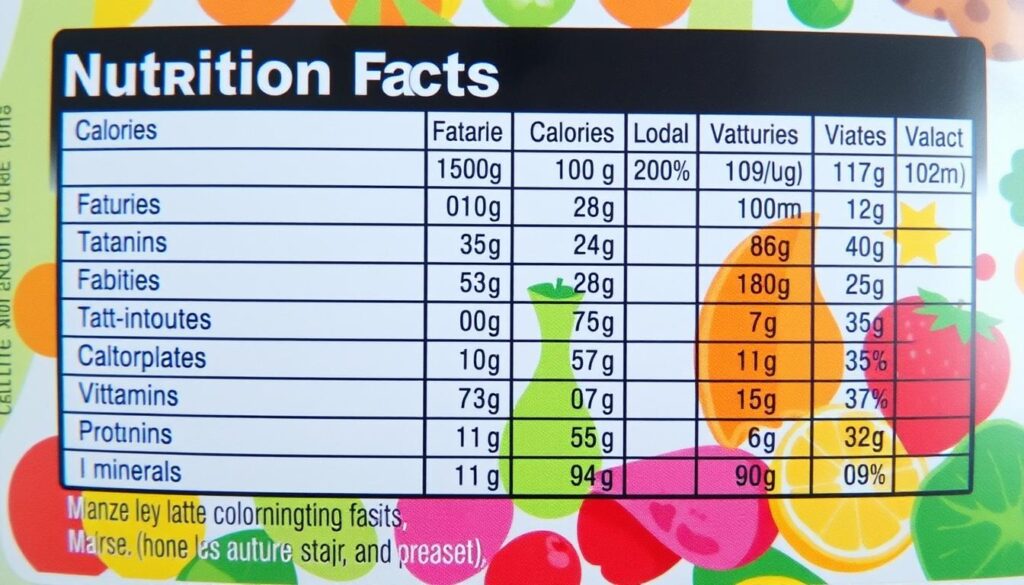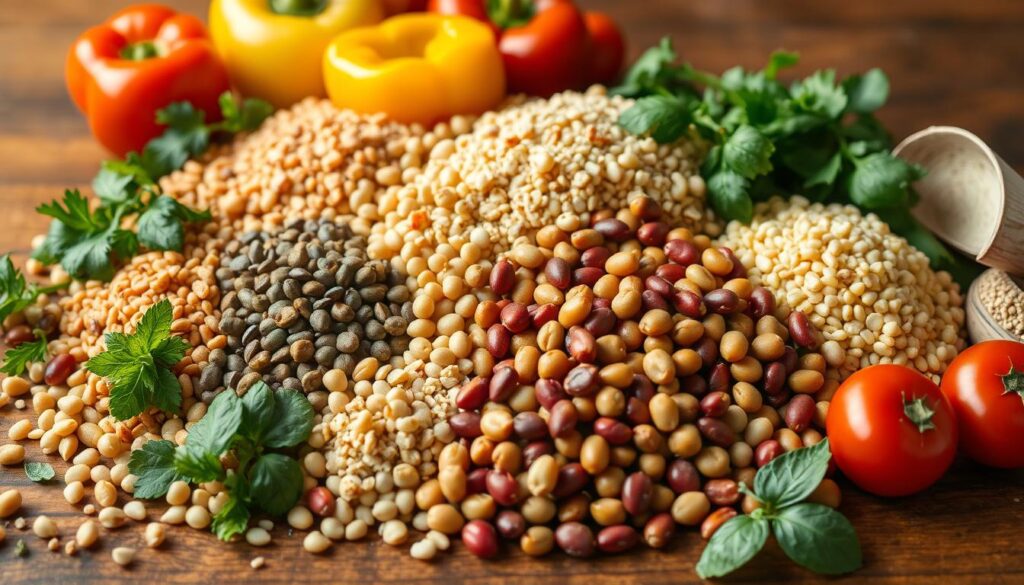Did you know over 60% of adults in the United Kingdom struggle with a balanced diet? This fact shows how crucial it is to eat healthily for our well-being. In this guide, you’ll find easy tips to start eating better and change your life.
Learning about whole, nutrient-rich foods and controlling portions is key. This article will give you the tools to eat well. Whether you want more energy, to lose weight, or just live healthier, we’ve got you covered.
Key Takeaways
- Embrace a diet rich in whole, nutrient-dense foods to nourish your body.
- Develop an understanding of portion control to maintain a balanced intake.
- Practice mindful eating to savor every bite and foster a positive relationship with food.
- Decode food labels to make informed choices about the products you consume.
- Plan ahead to ensure you have a steady supply of healthy, wholesome meals.
Embrace Whole, Nutrient-Dense Foods
Eating whole, unprocessed foods is key to a healthy, plant-based life. Fill your plate with lots of fruits and vegetables. Also, add hearty whole grains for their fiber and nutrients.
Fruits and Vegetables: Nature’s Bounty
Fruits and vegetables are full of vitamins, minerals, and antioxidants. They help keep you healthy. From leafy greens to juicy berries, they’re packed with good stuff for your body.
Whole Grains: Fiber-Rich Fuel
Add whole grains like quinoa, brown rice, and whole wheat to your meals. They give you complex carbs, fiber, and nutrients. These plant-based foods aid digestion, balance blood sugar, and give you energy.
Portion Control: The Key to Balance
Achieving a balanced diet is more than just picking the right foods. Portion control is key to keeping a healthy weight and getting the right nutrients. Learning to control portions can lead to a balanced lifestyle.
Mindful eating is a big part of portion control. It means listening to your body’s hunger and fullness signals. This way, you can enjoy your food more and stop when you’re full. It helps you avoid eating too much and keeps your diet balanced.
- Use smaller plates and bowls to gauge the right portion sizes.
- Slow down and chew your food well. This helps with portion control and digestion.
- Know when you’re hungry and when you’re full. Stop eating when you’re just satisfied.
- Enjoy treats and high-calorie foods in moderation. Portion control is key for a healthy diet.
Portion control isn’t about cutting out food or feeling deprived. It’s about finding the right balance and listening to your body. By using these tips, you can have a varied and healthy diet while reaching your health goals.
Healthy Eating: The Foundation of Well-being
Healthy eating is more than just physical health. It’s about nourishing your mind and emotions too. At the core is mindful eating and the power of superfoods.
Mindful Eating: Savor Every Bite
Mindful eating changes how you eat. It makes you slow down and enjoy every bite. You start to notice the flavors, textures, and smells of your food.
This practice helps you feel more satisfied and improves digestion. It also makes you more present in the moment.
Superfoods: Unlock Their Power
Superfoods are packed with nutrients that boost your health. They include antioxidant-rich berries and omega-3-packed chia seeds. These foods are full of vitamins, minerals, and phytochemicals.
Adding superfoods to your diet can strengthen your immune system. It can also improve your brain function and make your skin glow.
By practicing mindful eating and choosing plant-based superfoods, you nourish your body and mind. This is a holistic way to improve your well-being.
Decode Food Labels with Ease
Understanding food labels can seem hard, but it’s key for healthy choices. Knowing the nutrition facts panel helps you make smart buys. It makes label reading easy and part of your shopping routine.
Navigating Nutrition Facts
The nutrition facts label is your guide to what’s in your food. Here’s what to look at when decoding food labels:
- Serving Size: This shows the right portion size, which is key for the other nutrient info.
- Calories: Check the total calories per serving. It helps you control your calorie intake.
- Macronutrients: See the fat, carbs, and protein amounts. They help balance your diet.
- Micronutrients: Look for vitamins and minerals. They offer important nutritional info.
- Percent Daily Value: This percentage shows how much a nutrient in a serving meets your daily needs. It guides your diet choices.
Learning these key points makes you a pro at label reading. You’ll use food labels to your advantage.

Plan Ahead for Success
Starting a healthy lifestyle often begins with meal planning and grocery shopping. By planning your meals and stocking up on healthy foods, you save time. This makes healthy habits easy to follow every day.
Start by setting aside a few minutes each week for meal planning. Think about your schedule and pick recipes that fit. This helps you avoid unhealthy takeout and impulse buys.
Then, make a detailed grocery shopping list from your meal plan. Organize it by section to save time in the store. Include lots of fresh produce, whole grains, and lean proteins. Shopping with a plan helps you avoid buying things that aren’t good for you.
- Set aside time each week for meal planning
- Make a detailed grocery shopping list
- Batch cook or prep ingredients to save time management
- Try new healthy habits like new recipes or ingredients
Also, find ways to make kitchen tasks quicker, like batch cooking. This helps on busy nights. Don’t be scared to try new things in the kitchen, like a new recipe or ingredient.
Planning ahead and making smart grocery choices leads to long-term success in eating well. With a little prep, healthy eating can become a natural part of your life.
Discover the Joy of Plant-Based Eating
Exploring plant-based eating is a fun and rewarding journey. You’ll find a wide variety of whole, plant-based foods. These foods are packed with nutrients and flavors.
From plant proteins to fruits and vegetables, you’ll learn how to add them to your meals. You’ll enjoy nourishing your body with plant-based goodness.
Plant Proteins: Versatile and Delicious
Plant proteins are not just for vegetarians and vegans. They’re great for anyone who wants to eat more whole foods. Legumes, nuts, seeds, and soy products are full of plant proteins.
These plant-based options can be added to many dishes. Discover new ways to use them in your meals for a tasty and healthy experience.

Looking to eat less meat or try new foods? Plant-based eating is a fun and tasty adventure. Try different plant proteins, fruits, and vegetables. You’ll make meals that are full of flavor and make you feel great.
Fuel Your Body, Nourish Your Mind
Healthy eating is more than just fueling your body. It’s also about taking care of your mind. By choosing the right foods, you can boost both your mental and physical health.
Eating a balanced diet full of whole foods gives your brain what it needs. This can make you think clearer, feel happier, and support your mental well-being.
Start a lifestyle that cares for your whole body. Here are some daily tips:
- Eat lots of fruits and veggies for their nutrients and antioxidants.
- Opt for whole grains over refined ones for better energy and mood.
- Drink plenty of water to keep your brain and body healthy.
- Add superfoods like leafy greens, berries, and nuts to your meals.
By taking care of your body and mind, you start a journey of whole-body wellness. This journey will make your life more vibrant and fulfilling. Fuel your body, nourish your mind, and enjoy the benefits of a balanced diet.
Conclusion
In this guide, you’ve learned how to live a healthy, balanced life through mindful eating. You now have the tools to change how you view food. This will help you enjoy a life full of energy and well-being.
The path to wellness is a long one, but small steps can make a big difference. Start by eating more whole foods and learning about portion sizes. Also, learn to read food labels and discover the power of superfoods.
Enjoy the taste, texture, and smell of healthy foods. Mindful eating is not just about food; it’s about feeling good too. By focusing on healthy eating, you’ll feel more energetic, happy, and ready to live your best life.
FAQ
What are the key principles of healthy eating?
Healthy eating focuses on whole foods like fruits, veggies, whole grains, and lean proteins. It’s also about portion control and eating mindfully. Make sure your diet has a good mix of protein, carbs, and healthy fats.
How can I incorporate more plant-based foods into my diet?
Start by adding more fruits, veggies, whole grains, legumes, nuts, and seeds to your meals. Try new recipes and find plant-based dishes you like. This will help you enjoy eating more plant-based foods.
What are some effective strategies for portion control?
Use smaller plates and measure your food to control portions. Eat mindfully and know the right serving sizes. Portioning meals ahead of time and listening to your hunger cues also helps.
How can I make healthy eating a sustainable lifestyle change?
Make small, gradual changes to your diet. Involve your loved ones and plan meals in advance. Make healthy eating fun and remember, it’s about making progress, not being perfect.
What are the benefits of eating mindfully?
Mindful eating helps you understand your hunger and fullness better. It leads to more satisfying meals. It also reduces stress and improves your relationship with food, making it healthier.
How can I read and understand food labels?
Look at the nutrition facts panel for serving size, calories, and nutrients. Check the ingredient list for whole foods and avoid added sugars, sodium, and unhealthy fats.
What are some simple meal planning tips?
Plan your meals for the week and make a grocery list. Prep ingredients early and use a variety of healthy foods. Batch cooking and using leftovers can save time and keep you healthy.
How can I incorporate more superfoods into my diet?
Add superfoods like berries, leafy greens, nuts, seeds, and avocados to your meals. Try them in smoothies, salads, soups, or as snacks. Experiment with different combinations to find your favorites.
How does healthy eating benefit my overall well-being?
Healthy eating boosts your physical health and improves your mental and emotional well-being. It gives you more energy, better mood, and supports your brain health. This leads to a more vibrant and fulfilling life.

